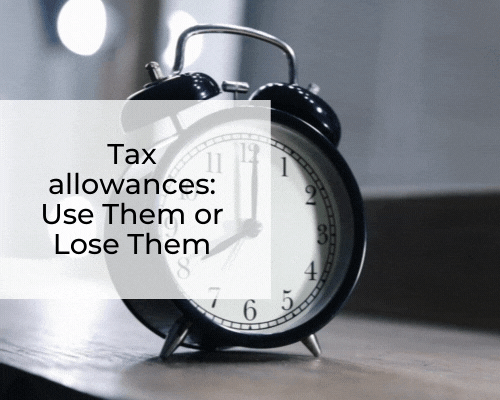
If you’re a saver, the next few weeks are extremely important for the health of your finances.
As we approach spring and – fingers crossed – emerge blinking into the post-Covid sunlight, the Chancellor will be casting a critical eye over the state of public finances.
As we pointed out in last month’s newsletter, thanks to the pandemic, the government has had to run up our national debt to more than £2 trillion. That’s not sustainable, the books will have to be balanced and that suggests tax rises, perhaps in the form of reduced allowances. This could come as soon as the next tax year, which begins in April. There has been speculation, for example, about the reduction of relief on pension contributions by higher rate tax payers, or dropping the annual tax free amount for Capital Gains Tax, or double-taxing heirs on both CGT and Inheritance Tax.
Therefore, as part of our end of year tax planning campaign, we are urging clients to go through the annual tax check list. This year in particular you should be taking advantage of any valuable tax reliefs before the end of March, or you risk losing them and, potentially, thousands of pounds.
Here’s our usual annual checklist for you, whether you’re still working, or retired.
In work
If you’re still working, maximise your pension allowance as much as you can afford, up to the £40,000 annual limit. The generous tax relief immediately grows your pension in a way that would otherwise take years. For a basic rate taxpayer, this relief is 20%, so the government will add £8,000 to a £40,000 contribution – double that, if you’re a higher rate taxpayer.
If you have unused allowances from three years ago, this is your last chance to use them. Someone who hasn’t paid in anything this year or the previous three could pay in up to £160,000.
If you’re worried that you might need access to cash, bear in mind, if you’re 55 or are approaching that age, in making these contributions, you’re not putting that money beyond your reach. You can start to access your pension from the age of 55.
If you own your own company, pension contributions made to you by the business as your employer are a tax efficient way of extracting profits - useful if you’ve accumulated cash in the business, as you’ll not only save yourself 19% in corporation tax but also benefit from the pension relief.
Under the exchange salary for pension contributions scheme, by mutual agreement with their employer, an employee can exchange some of their remuneration, whether that’s salary or bonus, in return for a larger pension contribution from their employer. This saves on National Insurance that would have been paid by both the employer and employee.
Also, don’t forget your ISA, your own personal tax haven, where dividends and capital growth are income tax and capital gains tax free. You can contribute up to £20,000 to your ISA or ISAs in any tax year, but these allowances can’t be carried forward. Again, it’s a case of use it or lose it.
Retired
Don’t forget to ensure that you and – if married - your spouse are making the most of your personal allowances. Tax allowances aren’t transferable and those of both partners should be used to the full. By using both personal income tax allowances, two people can have a joint income of £25,000 a year tax free.
Couples who are drawing income from their pension funds, can top up the tax free element by using ISAs which are tax free.
Also, remember, if you have reached retirement and have no earned income, you can still contribute up to £3,600 gross a year to your pension and benefit from the tax relief.
Conclusion
As you endure lockdown, take some time out from the jigsaws and baking banana bread and talk to your Reeves adviser to go through the end of year tax checklist.
__________________________________________________________________
The content of these articles are for information only and should not be seen as advice or recommendation to act. If you do wish to take action, seek independent advice first as your circumstances may be different to what has been discussed in these articles. When investing, your capital is at risk and it may go down as well as up. You may not get back the original capital invested. Pension investment should be seen as a long term investment. Please note that pension legislation can and may change in the future.

